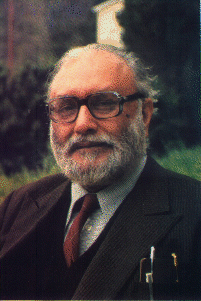
BIOGRAPHY OF ABDUS SALAM ( 1926 - 1996 )
-
born Jan. 29, 1926, Santokdas, Punjab.
died Nov. 21, 1996, Oxford, England.
|
|
BIOGRAPHY OF ABDUS SALAM ( 1926 - 1996 )
died Nov. 21, 1996, Oxford, England. |
Dr. Abdus Salam (Mohammed Abdus Salam) (January 29, 1926 at
Santokdas, Sahiwal in Punjab – 21 November 1996 in Oxford, England) was a Pakistani theoretical physicist who received
the Nobel Prize in Physics in 1979 for his work in electroweak theory which is the mathematical and conceptual synthesis
of the electromagnetic
and weak interactions, the latest stage in the effort to provide a unified description of the four fundamental forces
of nature. Salam, Sheldon Glashow and Steven Weinberg arrived at the theory independently and shared the prize.
The validity of the theory was ascertained through experiments carried out at the Super Proton Synchrotron facility at
CERN in Geneva, particularly through the discovery of the W and Z bosons.
Abdus Salam was an exceptional student in high school. According to his Nobel Prize biography, when he cycled home from
Lahore, at the age of 14, after gaining the highest marks ever recorded for the Matriculation Examination at the
University of the Punjab, the whole town turned out to welcome him. His first paper was written as a student
there in 1943 and concerned Srinivasa Aiyangar Ramanujan.
During the early 1960s Salam played a very significant role in starting Pakistan's Atomic Energy Commission and
Suparco - country's space agency. Founder and Director of the
International Centre for Theoretical Physics (ICTP), Trieste, Italy from 1964 to December 1993,
Salam was a firm believer that "scientific thought is the common heritage of mankind", and that developing nations needed
to help themselves and invest into their own scientists to boost development and fill the gap between
the rich North and the poor South of the planet, thus contributing to a more peaceful world.
Salam also founded the Third World Academy of Sciences (TWAS) and was instrumental in the creation of a
number of international centres dedicated to the advancement of science and technology.
From 1956 he was Professor of Theoretical Physics at Imperial College of University of London.
In 1964, he founded the International Centre for Theoretical Physics, Trieste in Northeastern Italy.
Professor Salam was a devout muslim who belonged to the Ahmadiyya Community and therefore Abdus Salam is not
sufficiently recognized by the Pakistani government for being country's first and only Nobel Laureate.
He had very broad field of interests in science and philosophy and was elected a Member of the Pontifical
Academy of Sciences, Vatican.
Salam died at 70 in Oxford in 1996, after a long illness. He was buried (without any official protocol) in Rabwah,
Pakistan.
There are a few places where the biography of ABDUS SALAM can be found.
Wikipedia electronic Encyclopedia(http://en.wikipedia.org/) , an article ABDUS SALAM.
Biographies of the Nobel Prise winners at Nobel Prise ArXiv.
ICTP BIOGRAPHY: an article ABDUS SALAM.